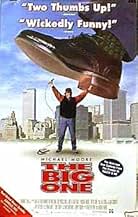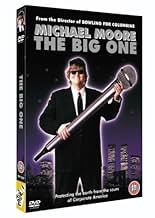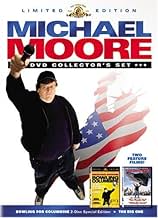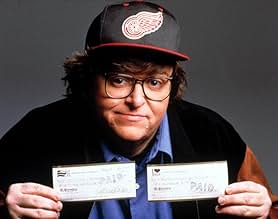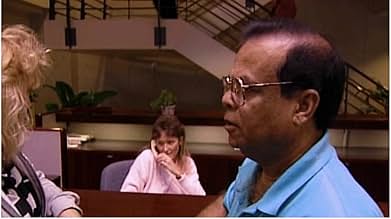IMDb-BEWERTUNG
7,1/10
8116
IHRE BEWERTUNG
Füge eine Handlung in deiner Sprache hinzuOn his book tour, Michael Moore exposes wrongdoing by big greedy businesses and callous politicians around America.On his book tour, Michael Moore exposes wrongdoing by big greedy businesses and callous politicians around America.On his book tour, Michael Moore exposes wrongdoing by big greedy businesses and callous politicians around America.
- Auszeichnungen
- 6 wins total
Bill Clinton
- Self - Presidential Candidate
- (Archivfilmmaterial)
Jim Czarnecki
- Self
- (as Jim)
Brian Danitz
- Self
- (as Brian)
Robert Dornan
- Self - Congressman
- (Archivfilmmaterial)
Steve Forbes
- Self - Presidential Candidate
- (Archivfilmmaterial)
Empfohlene Bewertungen
Yet more excellent work from documentarian Michael Moore as he hits the road in 1996 for a 47-city tour to promote his new book "Downsize This". Funded by Random House Publishing, with that company having no idea that Moore is not just going to sign books, the all-world film-maker pulls no punches as he gets to the heart of corporation down-sizing just as some of the biggest money-makers in the U.S. start to have all-time record high profits. We see regular folks laid off by monsters like Pay Day (the candy bar company), Procter & Gamble, General Motors, Johnson Controls and Pillsbury. National corporations leaving the U.S. to pay lesser fees to employees in third-world countries is explained in great detail and Moore even has a unique conversation with Phil Knight, the CEO of Nike (also the only CEO brave enough to verbally spar), and needless to say Moore comes out looking much better than his opponent. "The Big One" shows the lack of political choices for the general public (the film makes it blatantly clear that the Clinton/Dole race of 1996 was a no-win vote) as blue-collar, middle-class workers fall in the work-place due to the lack of government control on power-mad corporations that only look at the bottom line and constantly talk about competition in their industry (this makes the big-wigs look even sillier in reality). The main theme from "Pulp Fiction" late during Moore's run of metropolitan areas ends up setting the overall tone of this exceptional documentary feature. 5 stars out of 5.
The Big One (1997) presents itself as a spontaneous documentary of Michael Moore's outrageous adventures during the tour of his book, "Downsize This!" Moore does a good job of focusing on what's wrong in America- people work 60+ hours a week just to get by, profitable, productive factories closing to move to Mexico where workers are paid 60 cents an hour.
Unfortunately, for all of Moore's focused anger at corporate America, Moore doesn't offer much of a solution. When someone asks him why he didn't limit his book tour to union or non-corporate stores, he makes a joke about the success of his book changing his politics. Moore asks a corporate spokesperson if she thinks it's a good idea for the US to pass punitive laws against profitable corporations who export their labor to other countries. This is admirable, but I wish he had followed up on his own question.
In this film, Moore comes across as someone who has spent a lot of time focused on America's problems, but spends only a token effort in dwelling on potential solutions. This imbalance handicaps what could have been a sublimely entertaining, informative documentary. I expected information at the end of the movie about corporate ethics organizations like Corporate Watch (http://www.corpwatch.org) or information on how to start a labor union (http://www.aflcio.org). Alas, no such luck.
Despite its faults, The Big One (1997) is a must-see for anyone who believes 1) unions are corrupt; 2) corporations are corrupt; or 3) earns a salary of less than six figures a year.
Unfortunately, for all of Moore's focused anger at corporate America, Moore doesn't offer much of a solution. When someone asks him why he didn't limit his book tour to union or non-corporate stores, he makes a joke about the success of his book changing his politics. Moore asks a corporate spokesperson if she thinks it's a good idea for the US to pass punitive laws against profitable corporations who export their labor to other countries. This is admirable, but I wish he had followed up on his own question.
In this film, Moore comes across as someone who has spent a lot of time focused on America's problems, but spends only a token effort in dwelling on potential solutions. This imbalance handicaps what could have been a sublimely entertaining, informative documentary. I expected information at the end of the movie about corporate ethics organizations like Corporate Watch (http://www.corpwatch.org) or information on how to start a labor union (http://www.aflcio.org). Alas, no such luck.
Despite its faults, The Big One (1997) is a must-see for anyone who believes 1) unions are corrupt; 2) corporations are corrupt; or 3) earns a salary of less than six figures a year.
The earliest of Moore's films I've seen so far, this is definitely not his best work... technically, this is the least impressive of the ones I've seen(the others are Bowling For Columbine and Fahrenheit 9/11). The editing, pacing and presentation just isn't as sharp or clean as the other two. The score isn't as ironic or fitting either. The humor, tone and 'direction' is just as good, though. This time, Moore takes a clean shot at corporate America, and clearly exposes the indifference of the common man's fate displayed by all executives. Several times in the documentary we're introduced to companies that, despite of high profits and no problems with their workers are laying people off, closing and moving factories... putting people out of work, effectively robbing them of their livelihood. As usual, it's done in Moore's fashion of outlining the facts that support his cause and denying or ignoring the ones that do not. Of course, he gets so many laughs throughout that you barely notice it... and what he says is true, at least to a certain extent. The interviews in which Moore asks all the right questions, usually very controversial and direct are inter-cut with what appears to be a stand-up performance by him, which adds a sense of closeness that means a lot for the effect of the film. Not as memorable and interesting as Bowling or Fahrenheit, but most definitely worth watching. I recommend this to any fan of Michael Moore and humorous documentaries. 8/10
The movie is frequently reminiscent of Letterman, visiting corporate headquarters with silly stunts - there's no way for the victims to win; even when they play along, as Phil Knight tries to, there's no room for rational argument. Moore is pretty engaging and energetic, but it soon becomes apparent that his movie has little ambition other than to string together such diverting moments and to hammer away at the main anti-downsizing theme. Astonishing that everyone makes the opposing case so poorly - it's a walk over; an overwhelming victory for the Forces Of Good. But Moore doesn't address the broader revolutions that would be required to make his ideas stick - the corporate heads are surely culpable, but if they didn't play along they'd be fired: it's investment-obsessed America (Beardstown Ladies and all) that keeps this crazy cycle going. Moore has a great gift for getting into the middle of activity and is a great raconteur, but for someone so relentlessly pure on hammering at the same anti-capitalist drum he leaves his own success conspicuously unexamined. The ragbag style is always entertaining though and the film has an appealing zippy pace - reservations aside, the uncertain encounter with Knight makes for a good climax.
As one user before said, he feels the film to be more of a time capsule today, since the impacts and importance of downsizing has been overwritten by other issues like terrorism, homeland security, 9/11 etc.
Well, I live in Europe and I can just say that here in Europe the film just comes out on DVD (I saw it only yesterday, July 15th, 2004 on TV) at the right time for Europe (if not a little too late). Economical matters are getting worse here in Europe day by day, and the patterns CEO's use to make their companies "profitable" (which should just always correctly read: "MORE profitable) are just the same as CEO's use in the USA. In fact, the only idea that comes to their minds is: downsizing, laying off people and transferring labour into countries with extremely cheap labour-cost. That's all.
Surprisingly there is just very little resistance to these tendencies, even though Europe is (in most countries) far better organised as far as Labour Unions are concerned. People are told by politicians that reforms are necessary, and people just sit back and accept it and continue to suffer.
In this context, "The Big One" by Michael Moore just comes at the right time here in Europe, even though I think that not many of the concerned people will actually see it.
But it's worth watching it, even though sometimes I questioned myself how I could laugh over such sad facts. But this is the virtue of Michael Moore and this film: it doen't leave you desperate, it gives you a laugh at the time and maybe, if we're all lucky, it will lead to a better organisation of the people concerned and to more resistance against the 1 percent of the rich keeping the rest in poverty.
Well, I live in Europe and I can just say that here in Europe the film just comes out on DVD (I saw it only yesterday, July 15th, 2004 on TV) at the right time for Europe (if not a little too late). Economical matters are getting worse here in Europe day by day, and the patterns CEO's use to make their companies "profitable" (which should just always correctly read: "MORE profitable) are just the same as CEO's use in the USA. In fact, the only idea that comes to their minds is: downsizing, laying off people and transferring labour into countries with extremely cheap labour-cost. That's all.
Surprisingly there is just very little resistance to these tendencies, even though Europe is (in most countries) far better organised as far as Labour Unions are concerned. People are told by politicians that reforms are necessary, and people just sit back and accept it and continue to suffer.
In this context, "The Big One" by Michael Moore just comes at the right time here in Europe, even though I think that not many of the concerned people will actually see it.
But it's worth watching it, even though sometimes I questioned myself how I could laugh over such sad facts. But this is the virtue of Michael Moore and this film: it doen't leave you desperate, it gives you a laugh at the time and maybe, if we're all lucky, it will lead to a better organisation of the people concerned and to more resistance against the 1 percent of the rich keeping the rest in poverty.
Wusstest du schon
- WissenswertesMichael Moore: [Flint] Moore tries to convince Phil Knight to open a factory in Flint, Michigan.
- Zitate
Michael Moore: [referring to McDonald's] They put vegetables on my fish filet. Fuckers.
- Crazy CreditsTo make a reservation on TWA call 1-800-221-2000
- SoundtracksPanic In Detroit
(1973)
Written and Performed by David Bowie
Courtesy of Jones/Tintoretto Entertainment Co., LLC
By kind permission of Tintoretto Music/RZO Music
EMI Publishing Ltd., Chrysalis Music
Top-Auswahl
Melde dich zum Bewerten an und greife auf die Watchlist für personalisierte Empfehlungen zu.
- How long is The Big One?Powered by Alexa
Details
- Erscheinungsdatum
- Herkunftsländer
- Offizieller Standort
- Sprache
- Auch bekannt als
- The Big One
- Drehorte
- Produktionsfirmen
- Weitere beteiligte Unternehmen bei IMDbPro anzeigen
Box Office
- Bruttoertrag in den USA und Kanada
- 720.074 $
- Eröffnungswochenende in den USA und in Kanada
- 146.909 $
- 12. Apr. 1998
- Weltweiter Bruttoertrag
- 720.074 $
Zu dieser Seite beitragen
Bearbeitung vorschlagen oder fehlenden Inhalt hinzufügen

